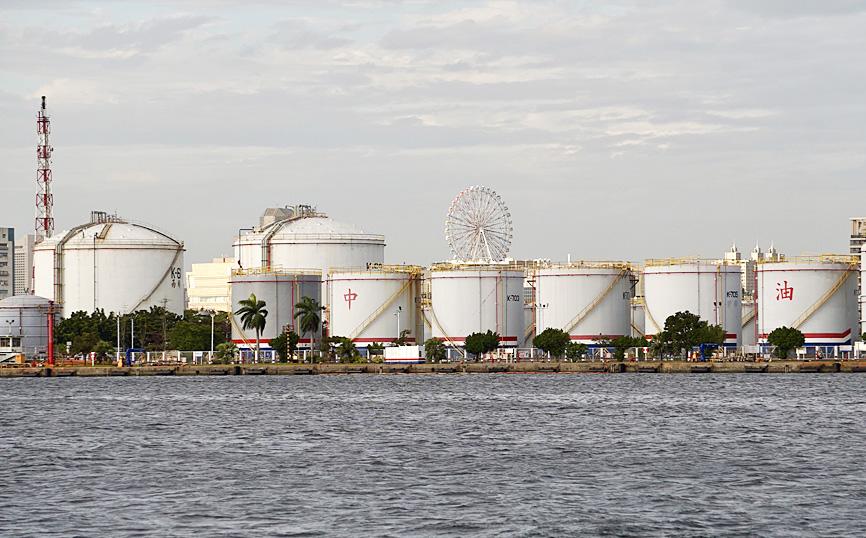The nation has sufficient energy reserves, the Ministry of Economic Affairs said yesterday, dispelling concerns over energy disruption after China announced it would hold live-fire drills in waters surrounding Taiwan from today to Sunday.
The drills are in retaliation for US House of Representatives Speaker Nancy Pelosi’s visit to Taiwan. The planned exercises stoked fears that energy shipments could be delayed and put Taiwan’s energy supply at risk.
The ministry said in a statement that the government has accumulated energy reserves for local consumption through state-run companies.

Photo: CNA
All vital energy stocks exceed regulatory safety levels, it said.
As building up energy reserves is an issue of national security, the government has made numerous contingency plans against Chinese military exercises, the ministry said.
“The nation has rules to keep energy reserves at safe levels. Besides, we have multiple energy sources,” the ministry said. “We are well-prepared with sufficient energy reserves. The public should not be worried about supply disruptions.”
The nation has crude oil reserves equivalent to 146 days of consumption, while natural gas reserves are at a level equivalent to 10 to 11 days of local consumption, the ministry said.
The nation’s coal stockpiles are sufficient for 39 days, it said.
To keep the nation’s energy reserves in check, the ministry is monitoring energy stocks with Taiwan Power Co (台電) and CPC Corp, Taiwan (台灣中油) on a daily basis, the statement said.
In light of China’s planned drills, gas suppliers are rerouting or reducing the speed of some liquefied natural gas (LNG) tankers en route to North Asia, people familiar with the matter said.
Shipments to Taiwan and Japan this weekend would be affected, the people said.
Shipping companies are also assessing their options and the actions threaten to disrupt one of the world’s busiest waterways.
Local branches of China’s maritime safety administration have issued multiple warnings for ships to avoid certain territories, citing the military exercises, while Taiwan’s Maritime and Port Bureau warned ships to find alternative routes to access and depart from seven major ports in Taiwan during China’s drills, the Chinese-language Apple Daily reported yesterday.
While the disruptions could exacerbate a shortage of LNG amid an energy crunch, delays of a few days are not uncommon. Shippers often face typhoons at this time of year that create similar disruptions.
Additional reporting by Bloomberg

South Korea’s equity benchmark yesterday crossed a new milestone just a month after surpassing the once-unthinkable 5,000 mark as surging global memory demand powers the country’s biggest chipmakers. The KOSPI advanced as much as 2.6 percent to a record 6,123, with Samsung Electronics Co and SK Hynix Inc each gaining more than 2 percent. With the benchmark now up 45 percent this year, South Korea’s stock market capitalization has also moved past France’s, following last month’s overtaking of Germany’s. Long overlooked by foreign funds, despite being undervalued, South Korean stocks have now emerged as clear winners in the global market. The so-called “artificial intelligence

NEW IDENTITY: Known for its software, India has expanded into hardware, with its semiconductor industry growing from US$38bn in 2023 to US$45bn to US$50bn India on Saturday inaugurated its first semiconductor assembly and test facility, a milestone in the government’s push to reduce dependence on foreign chipmakers and stake a claim in a sector dominated by China. Indian Prime Minister Narendra Modi opened US firm Micron Technology Inc’s semiconductor assembly, test and packaging unit in his home state of Gujarat, hailing the “dawn of a new era” for India’s technology ambitions. “When young Indians look back in the future, they will see this decade as the turning point in our tech future,” Modi told the event, which was broadcast on his YouTube channel. The plant would convert

‘SEISMIC SHIFT’: The researcher forecast there would be about 1.1 billion mobile shipments this year, down from 1.26 billion the prior year and erasing years of gains The global smartphone market is expected to contract 12.9 percent this year due to the unprecedented memorychip shortage, marking “a crisis like no other,” researcher International Data Corp (IDC) said. The new forecast, a dramatic revision down from earlier estimates, gives the latest accounting of the ongoing memory crunch that is affecting every corner of the electronics industry. The demand for advanced memory to power artificial intelligence (AI) tasks has drained global supply until well into next year and jeopardizes the business model of many smartphone makers. IDC forecast about 1.1 billion mobile shipments this year, down from 1.26 billion the prior

People stand in a Pokemon store in Tokyo on Thursday. One of the world highest-grossing franchises is celebrated its 30th anniversary yesterday.